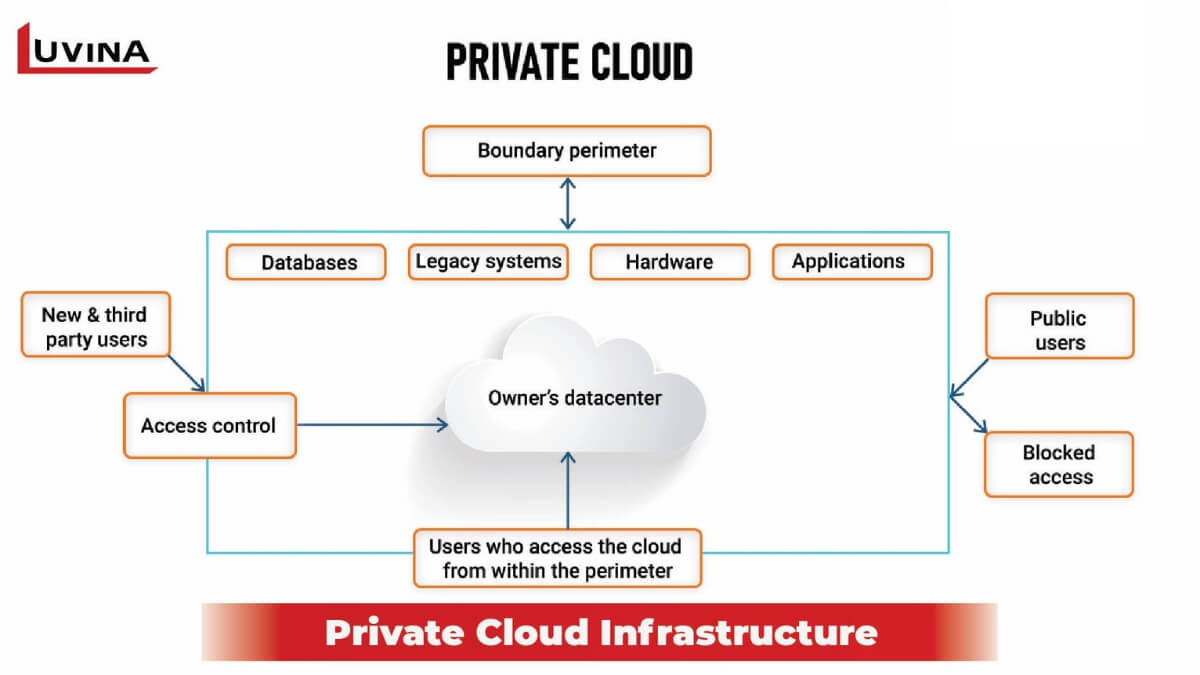In the ever-evolving landscape of cloud computing, businesses are presented with various deployment models to choose from. Among these, private cloud deployment models have gained prominence, offering distinct advantages that cater to specific organizational needs. In this article, we will delve into the realm of private cloud deployment models and explore the multitude of benefits they bring to businesses.

Understanding Private Cloud Deployment Models
Private cloud deployment models represent a subset of cloud computing tailored for exclusive use by a single organization. In contrast to public clouds, which serve multiple clients, private clouds are dedicated infrastructures designed to cater solely to the needs of a particular organization. This exclusive arrangement provides heightened control, customization, and privacy, allowing organizations to tailor the infrastructure precisely to their specific requirements and compliance standards. Private clouds offer a more secure and regulated environment, enabling organizations to manage sensitive data and critical workloads with greater confidence, as they have full control over security measures and access policies. The dedicated nature of private clouds ensures that computing resources, such as servers, storage, and networking, are utilized exclusively for the organization, fostering enhanced performance, reliability, and customization capabilities compared to multi-tenant public cloud solutions.
Benefits of Private Cloud Deployment Models
Private cloud deployment models offer a host of advantages that make them an attractive choice for businesses. Let’s examine these benefits in detail:
1. Enhanced Security and Privacy
One of the most compelling reasons for choosing a private cloud deployment model is enhanced security and privacy. Within a private cloud setup, organizations wield comprehensive control over their data and infrastructure, markedly reducing the risk of unauthorized access or data breaches. This granular control is especially critical for businesses handling sensitive and confidential information, such as financial records or healthcare data, where safeguarding privacy and compliance is paramount. Private clouds empower companies to customize and fortify security measures, tailoring them precisely to their distinct needs and stringent compliance standards. The ability to implement robust security protocols, encryption mechanisms, access controls, and dedicated firewalls within a private cloud setting fosters a robust defense against potential threats, ensuring a fortified fortress around sensitive data and sensitive operations. This heightened level of control and customized security measures offered by private clouds serves as a cornerstone for businesses seeking a secure and compliant environment to safeguard their most critical assets.

2. Customization and Control
Private clouds provide a high degree of customization and control. This empowers organizations to tailor the cloud environment precisely to their unique requirements, applications, and workloads. This unparalleled flexibility ensures that the infrastructure is aligned intricately with the business’s objectives, fostering optimized efficiency and performance. The capability to configure the cloud environment enables seamless integration with existing systems, facilitating a harmonious amalgamation of cloud-based resources with on-premises infrastructure or legacy systems. This seamless integration streamlines operations, allowing for a cohesive ecosystem where different components work synergistically.
Moreover, the flexibility within a private cloud environment permits organizations to adapt swiftly to changing needs, scale resources in response to evolving demands, and customize configurations to suit specific application requirements. This level of customization and control afforded by private clouds underpins an environment tailored precisely to the organization’s needs, driving operational efficiency and performance optimization within the cloud ecosystem.
3. Scalability and Performance
Scalability and performance are pivotal considerations for businesses, and private cloud deployment models excel in offering the flexibility to scale resources dynamically based on fluctuating demands. The ability to scale resources, whether scaling up to accommodate increased demand or scaling down during periods of reduced activity, is a hallmark of private clouds. This agility ensures that performance levels remain consistently high regardless of workload variations. During peak periods or increased demand scenarios, the capacity to scale resources upward swiftly and seamlessly enables businesses to meet surging demands without experiencing performance degradation or service interruptions.
Conversely, during quieter periods, scaling down resources optimizes cost efficiency without compromising performance. This inherent scalability within private cloud deployment models aligns seamlessly with business needs, allowing organizations to respond promptly to changing conditions, maintain optimal performance levels, and effectively manage resource utilization, ensuring a robust and agile infrastructure capable of accommodating varying workloads efficiently.

4. Cost-Efficiency
While the upfront costs of private cloud deployment models may appear higher, they often result in long-term cost-efficiency and savings. The customization and control inherent in private clouds facilitate optimized resource allocation, reducing unnecessary expenditures by tailoring resources precisely to the organization’s needs. Additionally, the enhanced performance and heightened security within private clouds can translate into substantial savings in operational costs. Improved performance levels lead to increased productivity and efficiency, potentially mitigating costs associated with performance bottlenecks or downtime. Similarly, the robust security measures intrinsic to private clouds can prevent potential data breaches or compliance violations, averting the considerable financial repercussions of security breaches. Ultimately, businesses should weigh the initial investment against the long-term cost-effectiveness of private clouds, factoring in the advantages of tailored resource allocation, improved performance, heightened security, and potential operational savings tailored to their unique requirements to determine the overall economic viability and benefits of private cloud deployment models.
Factors to Consider
When navigating the selection of a private cloud deployment model, businesses should weigh several critical factors to ensure an optimal fit. The level of control required over infrastructure and data management stands as a pivotal consideration, particularly for organizations seeking extensive customization and governance capabilities. Evaluating the sensitivity of the data being handled within the cloud environment becomes imperative, especially for industries dealing with highly confidential or regulated information. Compliance regulations further dictate the choice of private cloud, as certain industries require stringent adherence to specific standards, necessitating a cloud solution that aligns with these regulatory frameworks.
Moreover, forecasting long-term scalability needs is essential to ascertain that the chosen private cloud model can grow in tandem with the organization’s evolving demands. A meticulously planned strategy encompassing these factors is instrumental in leveraging the full spectrum of benefits offered by private clouds, ensuring that businesses harness enhanced control, data security, compliance adherence, and scalability tailored precisely to their unique operational requirements.
>> See more: Public cloud deployment models
Conclusion
In the world of cloud computing, private cloud deployment models stand out as a versatile solution, catering to organizations with specific requirements. Enhanced security, customization, scalability, and performance make private clouds an appealing choice for businesses seeking to optimize their cloud infrastructure. However, each business must carefully assess its unique needs and long-term goals to make an informed decision. Exploring the benefits of private cloud deployment models opens the door to greater control, efficiency, and security in the cloud.
As organizations continue to evolve and adapt to the digital age, private cloud deployment models will likely remain a fundamental component of their IT strategies. By embracing these benefits, businesses can confidently navigate the cloud landscape while achieving their objectives.
Related Posts:
- The Advantages of Hybrid Cloud Deployment Models
- Exploring Azure Cloud Deployment Models
- Unlocking the Potential of AWS Cloud Deployment Models
{ Get everything you ever
wanted to know about IT.}








Read More From Us?
Sign up for our newsletter
Read More From Us?
Sign up for our newsletter